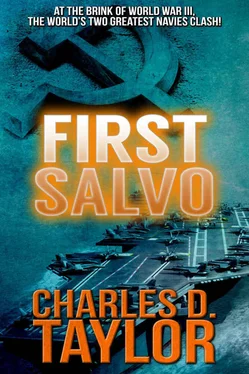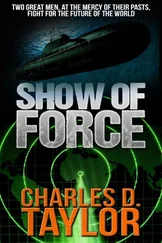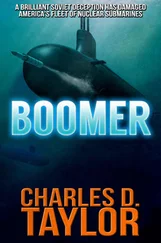Cobb’s destination was the Crimea. Attached by a narrow spit of land to Mother Russia, it jutted out into the Black Sea. The Crimea contained the historic cities of Sevastopol, home of the Russian Black Sea Fleet; Yalta, where Stalin twisted the arms of Churchill and Roosevelt in 1945; and Simferopol, training center for the terrorists who had so exacerbated the current Greek-Turkish conflict. The Crimea was also the location of General Keradin’s summer dacha, where the head of the Strategic Rocket Forces and his deputies were meeting that weekend. It was a strategy session, Cobb knew, just like those in Washington. However, DNI had explained to him personally that this was the final conference, the one that would decide at what stage they would launch and what the initial targets would be — if the Red Army did not own Western Europe within forty-eight hours after D-Day.
Lassiter and Cobb had worked together before. Neither one needed to speak until something important had to be said. Finally, Cobb broke the silence. “Where you going after this?”
Lassiter shrugged. “Depends if I still have this boat under my feet.” He brushed away the hair streaming over his face. “You know what the Russians are planning with this little war they engineered here?”
“Sure. They want to clean out the Bosporus and Dardanelles — the choke points. Then they can come and go as they please over the next few days.” The boat heeled to the side as one of her foils slid down a long swell. Cobb steadied himself with one hand on the railing. “It’s all a matter of choke points, I was told. Keep ’em in their holes and we’ve at least got a chance.”
“There’s a hell of a lot of them already out in the Med.”
“What they got out there so far we can handle,” Cobb said. “I saw the intelligence reports and some satellite photos. They sent a carrier through the other day. There’re still a lot of destroyers and cruisers in here, and just about all of the subs. The Montreux Convention doesn’t allow their subs to pass through the Turkish straits. I suppose they’re saving some of them to open the choke points and keep them open.”
“Makes sense,” Lassiter mused. “You know, Hank, I sure do love these little boats; turn on a dime, lots of power for your nickel.”
“Sounds like fun. I wish you had a few more.” He paused and contemplated the idea. “Perhaps I could hang around for an extra day or two.”
“We might locate a few more by tomorrow night.” Lassiter beamed.
They lapsed into silence. After a while, Cobb went below to change into his next outfit. When he came up again, Lassiter clapped his hands in amusement. Cobb was dressed like a Crimean peasant, the clothes authentic right down to the grape stains that a vineyard worker would have on his work clothes during harvest season. Keradin’s dacha was also a working winery, and Washington had decided such an outfit provided the only means for someone to get close to the general.
John Hancock rolled gently in the Mediterranean swell. The hum of her engineering plant came infrequently to Nelson’s ears. It was a sound that had so assimilated itself into his makeup over the years that he was already attuned to the ship he’d taken over just a few hours before.
It had been a quick and simple change of command. Nelson was escorted to the captain’s cabin as soon as he’d stepped from the helo on Hancock ’s fantail. Her CO went over the classified material in the captain’s safe, then offered a rundown on the department heads and the condition of the ship. As soon as they finished, the captain called the executive officer and told him to make final preparations. There was little time for niceties.
Five minutes later, those members of the crew not on watch assembled on the fantail. Nelson read his orders. He turned to the former captain, saluted, and intoned the ritual words, “I relieve you, sir.” He then became Commanding Officer of U.S.S. John Hancock , 7,800 tons of destroyer, as big as a modern cruiser — bigger than anything he’d ever ridden.
Now Wendell Nelson was reading the latest operation orders, the details put to paper by the administrative types. These were law, the golden words passed down from Washington to Norfolk to the fleet command in Naples to the battle group at sea to the individual commanding officers. Throughout his reading, Nelson always came back to what all captains of all surface ships knew — the carrier was the heart of the battle group, the one element that could launch a devastating strike on enemy territory. It was the ship that had to be protected at all costs. Destroyers were expendable!
Hancock was an antisubmarine destroyer with surface-to-air missiles for point defense. She was part of the screen whose duty was to protect the carrier from submarine attack, to search out and kill Soviet attack submarines before they got within range of the carrier.
He finished his reading and carefully locked the material back in his safe. On top he placed the shrink-wrapped op orders that were only to be opened when Condition One was set — when war was declared.
Nelson ambled up to the bridge after a tour around the main deck of the ship. He leaned on the railing outside the pilothouse for a moment, adjusting his eyes to the darkness so he could identify the other ships in the screen. In the center, miles distant, he could make out the mass of the carrier John F. Kennedy.
Then he went into the pilothouse to the chart table and opened the night orders. The chief yeoman was efficient — Nelson’s orders were already inserted in plastic to protect them from weather. And, he noted, they had already been passed around the wardroom, for the signature of each officer was already below them. It was a good omen, he decided — a good, efficient ship. He knew they’d do a fine job for him. The wardroom’s initial surprise at a black CO gave him an advantage early on, he decided, remembering the night he’d been drinking with Dave Pratt and Bernie Ryng in some long-forgotten “O” club. Ryng had claimed Nelson’s dark features were inscrutable, a perfect face for intelligence work. Pratt had agreed with Bernie. An inscrutable captain also, Nelson mused now with amusement.
He wandered out on to the bridge wing again and stared back over at the imposing outline of Kennedy. He was sure Pratt was on the bridge, surveying the new command surrounding him. I’m glad you’re calling the shot s, Dave , Nelson said to himself. We’ll do all right.
Like Cobb and Ryng, Carleton could sleep anywhere, and he took advantage of the long flight to rest himself as much as possible. But like Pratt and Nelson, he was also excited about his new command. He felt like a child wandering into a candy store clutching five dollars in his hand and with no one to tell him how to spend it.
Yorktown was the key to defending a carrier battle group from air attack. Her AEGIS fire-control system coupled with sophisticated detection and tracking functions could direct the weapons of the entire force. One-third of her cost was for the ship herself, the rest for an electronic installation unrivaled by any in existence. Tom had spent his last six months as a prospective commanding officer in schools and simulators. He’d commanded destroyers before and he was an engineer, but he had to relearn his trade, especially in accepting the reality that the commanding officer of an AEGIS cruiser no longer fought his ship from the bridge. Instead, he sat before a fire-control display system inside an electronics-filled space and communed with a computer to fight his ship.
It was a totally different Navy from the one his father served in during the Second World War. As a child, Tom had thrilled to tales of naval battles in the South Pacific. Today, Nimitz and Halsey and the rest of his great heroes from forty years before wouldn’t have the vaguest idea of how Yorktown operated. Within microseconds, her radars and radios and computers could analyze intelligence from distant submarines or surface ships, planes hundreds of miles away, invisible recon satellites, and strategic and tactical details compiled at shore bases halfway around the world. With all that data, her computers could then coordinate the weapons on those distant platforms.
Читать дальше












